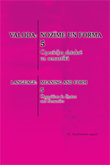Noliegtie runas verbi oriģinālā un tulkojumā
Negated speech verbs in the original text and translation
Author(s): Svetlana PolkovnikovaSubject(s): Language and Literature Studies, Theoretical Linguistics, Applied Linguistics, Baltic Languages
Published by: Latvijas Universitātes Akadēmiskais apgāds
Keywords: noliegums; runas verbi; oriģinālteksts; tulkojums; ekvivalents; semantika; konotācija;
Summary/Abstract: Contemporary linguistics still pays much attention to studying the category of negation. Studies of research literature lead to the conclusion that the category of negation is mostly regarded as a logically grammatical, functionally semantic and communicatively pragmatic one. Negation in language is actualized in two ways – implicitly and explicitly, and both means of negation are mutually related. Implicit negation as compared to the explicit one is not verbally marked; its semantics is revealed by the structure of the word meaning or syntactical constructions. From the formal standpoint, explicit negation is easier to perceive, whereas in disclosing implicit negation context plays a great role along with the speech situation and other extra-linguistic factors.Negation as a universal linguistic category is to a greater or lesser extent realized at all language levels, therefore in studying it there exist numerous approaches and theories. One of the traditional approaches is the semantic-functional one, according to which the devices of negation are regarded in close connection with their pragmatic load in the expression. The aim of the given research is to reveal the peculiarities of the realization of the category of negation based on the material of Latvian and Russian speech verbs. The empirical basis of the research is constituted of approximately 200 Russian-Latvian parallels that are excerpted from A. Chekhov’s stories and translations to Latvian. The excerpted examples may be divided into two groups. First, these are the negated speech verbs, i.e. verbs derived by the prefix ne- (the Russian analogue being a speech verb in combination with the particle of negation не) and that point in the context to the process of speech. Second, these are verbs with the semantics of silence or other semantics that ought to be analyzed in relation to the regarded topic. In this case we mean examples where negation as a semantic component is a part of the structure of the meaning of the speech verb.Contrasting Russian-Latvian parallels reveals that the semantics of negation is usually rendered consequently in translation. As a result, not only the meaning of the negated speech verb but also the whole expression acquires specific emphasis. The excerpted examples show that the semantics of negation is often actualized in dialogues and figurative descriptions, as negation is a powerful means of exerting influence that along with the speaker’s subjectively objective attitude towards the reality endows the context with manifold emotionally expressive connotations.
Journal: Valoda: nozīme un forma
- Issue Year: 2014
- Issue No: 5
- Page Range: 124-134
- Page Count: 11
- Language: Latvian

